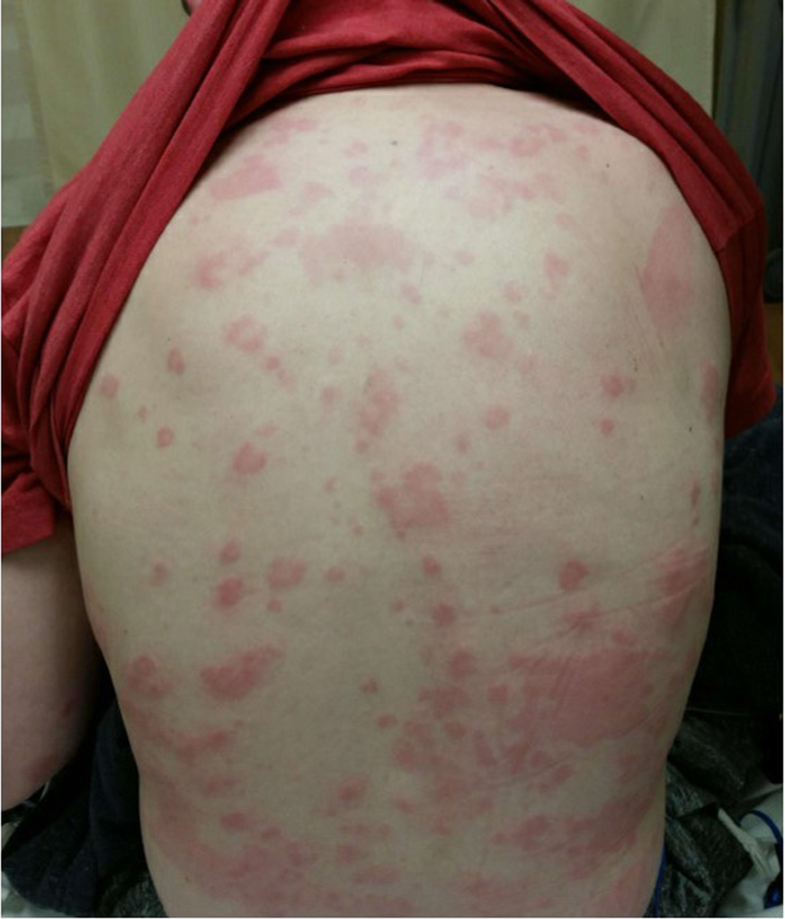- Home
- Editorial
- News
- Practice Guidelines
- Anesthesiology Guidelines
- Cancer Guidelines
- Cardiac Sciences Guidelines
- Critical Care Guidelines
- Dentistry Guidelines
- Dermatology Guidelines
- Diabetes and Endo Guidelines
- Diagnostics Guidelines
- ENT Guidelines
- Featured Practice Guidelines
- Gastroenterology Guidelines
- Geriatrics Guidelines
- Medicine Guidelines
- Nephrology Guidelines
- Neurosciences Guidelines
- Obs and Gynae Guidelines
- Ophthalmology Guidelines
- Orthopaedics Guidelines
- Paediatrics Guidelines
- Psychiatry Guidelines
- Pulmonology Guidelines
- Radiology Guidelines
- Surgery Guidelines
- Urology Guidelines
Vitamin D supplementation may help treat refractory chronic urticaria: a case report

Dr Irene Yuan at Geisel School of Medicine at Dartmouth, Hanover, NH, USA and colleagues have reported a case of Vitamin D supplementation treating chronic urticaria. The case has appeared in the Journal of Medical Case Reports.
Chronic urticaria affects approximately 1% of the population and is often a spontaneous phenomenon without a clearly identified allergen trigger. The authors have reported a case of a 14-year-old white boy with refractory chronic autoimmune vitamin D-responsive urticaria.
The sunshine vitamin, vitamin D, is a hormone with pleiotropic effects. Besides the role of Vitamin D in maintaining bone mineral homeostasis and calcium uptake it also plays an important role in maintaining endocrine, cardiovascular and immune functions. Some recent studies have shown that vitamin D deficiency may adversely affect heart health. Now researchers have deciphered how exactly vitamin D supplementation help in relieving chronic Urticaria.
In October 2017, our 14-year-old white male patient developed evanescent, pruritic, and bothersome urticaria that persisted over several months despite guideline-based therapy with non-sedating H1 blockade at four times the approved Food and Drug Administration (FDA) dosing (loratadine 10 mg twice daily and cetirizine 10 mg twice daily), H2 blockade (ranitidine 150 mg twice daily), and use of a leukotriene modifier (montelukast 5 mg once daily). His urticaria was recalcitrant to conventional treatment.
Allergen-specific immunoglobulin E (IgE) testing was negative to dust mites, cat, dog, roach, tree pollens, grass pollens, weeds, molds, latex, and galactose-a-1,3-galactose. Laboratory evaluation revealed an elevated serum tryptase (14.3 ng/mL; normal range ≤ 11.1 ng/mL), elevated anti-IgE receptor antibody (78% CD203c basophils), and normal thyroid-stimulating hormone (TSH). A low 25(OH)-D (vitamin D) at 23 ng/mL (normal 30–100 ng/mL) was identified as an incidental finding. A trial of omalizumab (300 mg every 4 weeks) was initiated in January 2018 but failed to provide benefit after four doses, and symptoms progressed to diffuse urticaria and facial angioedema prompting emergency evaluation for the worsening flare of urticaria and angioedema (Fig. 1).

On presentation to our emergency department in May 2018, vital signs were normal and a physical examination revealed patchy facial swelling, infraorbital edema, and urticarial lesions on his extremities, abdomen, and back. There was no respiratory or cardiovascular involvement. He initially received a 3-week course of orally administered corticosteroids (he did not receive an intravenously administered glucocorticoid), but when symptoms failed to improve after 2 weeks, he was started on hydroxychloroquine 200 mg daily and vitamin D supplementation (50,000 IU weekly for five doses then 2000 IU daily) in June 2018.
Within 7 days of therapy initiation, his symptoms had completely resolved. He had attended four follow-up visits to the allergy clinic since his initial presentation when his therapies were weaned following this remission. Over the following months he had minor recurrences of manageable itching and minor urticaria which did not require medication.
For more details click on the link: https://doi.org/10.1186/s13256-019-2121-9

Disclaimer: This site is primarily intended for healthcare professionals. Any content/information on this website does not replace the advice of medical and/or health professionals and should not be construed as medical/diagnostic advice/endorsement or prescription. Use of this site is subject to our terms of use, privacy policy, advertisement policy. © 2020 Minerva Medical Treatment Pvt Ltd